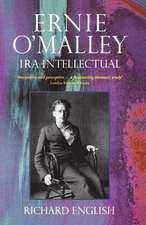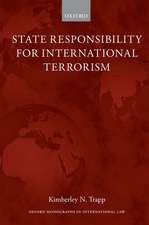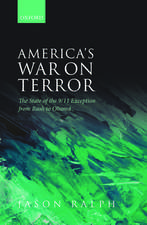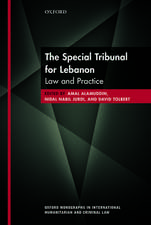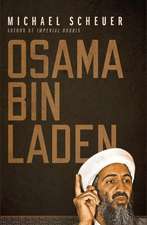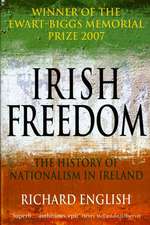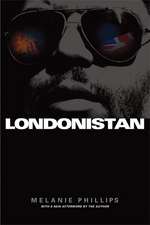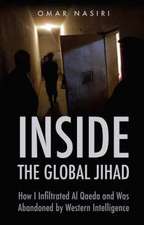Terrorism: How to Respond
Autor Richard Englishen Limba Engleză Paperback – 8 iul 2010
Preț: 87.53 lei
Preț vechi: 106.22 lei
-18% Nou
Puncte Express: 131
Preț estimativ în valută:
16.75€ • 17.49$ • 13.86£
16.75€ • 17.49$ • 13.86£
Carte tipărită la comandă
Livrare economică 24-31 martie
Livrare express 27 februarie-05 martie pentru 37.60 lei
Preluare comenzi: 021 569.72.76
Specificații
ISBN-13: 9780199590032
ISBN-10: 0199590036
Pagini: 192
Ilustrații: 15 black and white plates
Dimensiuni: 129 x 196 x 15 mm
Greutate: 0.22 kg
Editura: Oxford University Press
Colecția OUP Oxford
Locul publicării:Oxford, United Kingdom
ISBN-10: 0199590036
Pagini: 192
Ilustrații: 15 black and white plates
Dimensiuni: 129 x 196 x 15 mm
Greutate: 0.22 kg
Editura: Oxford University Press
Colecția OUP Oxford
Locul publicării:Oxford, United Kingdom
Recenzii
If you want to read one book which explains the phenomenon of terrorism, gives you a good historical grasp of the subject while also providing a dispassionate roadmap to guide you through the term's complex meanderings and its many intellectual cul-de-sacs, then this is the book for you. It is outstanding: short and beautifully written, it manages also to be thoroughly on top of its subject.
The clearest thinking on this scourge to have come along in many years.
The best guide to this subject.
This is a very fine book. It is elegant and persuasively argued from a man who really does know what he is talking about. The long view of Richard English is vital in an age of the knee-jerk.
A sober corrective to some dangerous recent misconceptions.
This book strikingly presents questions to scholars, practitioners, and society as a whole as to what the exact meaning of terrorism should be. More important, it presents an argument for a new approach to combating and understanding terrorism ... [P]assionate and persuasive.
Excellent ... a highly accessible, incisive and erudite introduction to the nature, morality, causes and responses to contemporary terrorism rooted in a thorough engagement with history ... a fresh and stimulating perspective on the perennial issues of this perplexing form of contemporary political violence.
Thoughtful, informed meditation on the state of terrorism research.
English negotiates a sophisticated path through the questions of definition and explanation that have long dominated this field ... [The book] retains a credibility and persuasiveness lacked by many of its competitors [and] advances our understanding of terrorism, its costs and its consequences considerably.
A useful and accessible text for scholars and policymakers alike ... English's book brings much needed attention to the state and the central role it plays in sustaining and ending terrorism ... [it] explores both the analytical and practical problems associated with terrorism.
A thought-provoking primer for politicians seeking something to stimulate them.
Provocative ... controversial.
The clearest thinking on this scourge to have come along in many years.
The best guide to this subject.
This is a very fine book. It is elegant and persuasively argued from a man who really does know what he is talking about. The long view of Richard English is vital in an age of the knee-jerk.
A sober corrective to some dangerous recent misconceptions.
This book strikingly presents questions to scholars, practitioners, and society as a whole as to what the exact meaning of terrorism should be. More important, it presents an argument for a new approach to combating and understanding terrorism ... [P]assionate and persuasive.
Excellent ... a highly accessible, incisive and erudite introduction to the nature, morality, causes and responses to contemporary terrorism rooted in a thorough engagement with history ... a fresh and stimulating perspective on the perennial issues of this perplexing form of contemporary political violence.
Thoughtful, informed meditation on the state of terrorism research.
English negotiates a sophisticated path through the questions of definition and explanation that have long dominated this field ... [The book] retains a credibility and persuasiveness lacked by many of its competitors [and] advances our understanding of terrorism, its costs and its consequences considerably.
A useful and accessible text for scholars and policymakers alike ... English's book brings much needed attention to the state and the central role it plays in sustaining and ending terrorism ... [it] explores both the analytical and practical problems associated with terrorism.
A thought-provoking primer for politicians seeking something to stimulate them.
Provocative ... controversial.
Notă biografică
Richard English is Professor of Politics at Queen's University, Belfast, and author of the award-winning books Armed Struggle: The History of the IRA (2003) and Irish Freedom: The History of Nationalism in Ireland (2006). He is a frequent media commentator on terrorism and political violence - including work for the BBC, the Times Literary Supplement, the Irish Times, Newsweek, the Independent on Sunday, and the Financial Times - and he has lectured widely in Europe and America on the subject of terrorism.

